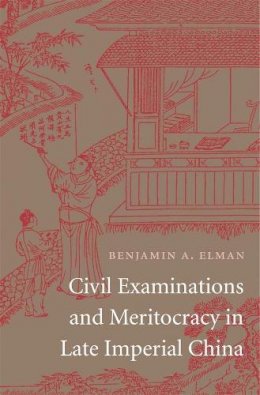8%OFF

Stock image for illustration purposes only - book cover, edition or condition may vary.
Civil Examinations and Meritocracy in Late Imperial China
Benjamin A. Elman
€ 57.08
€ 52.61
FREE Delivery in Ireland
Description for Civil Examinations and Meritocracy in Late Imperial China
Hardback. Chinese civil examinations, a piece of social engineering worked out over centuries, prefigured the regime of meritocratic exams that undergirds higher education around the globe today. This book describes how education, examinations, and civil service fostered the world's first professional class based on demonstrated knowledge. Num Pages: 344 pages, Illustrations. BIC Classification: 1FPC; 3J; HBJF; HBLH; HBLL; HBTB. Category: (G) General (US: Trade). Dimension: 235 x 163 x 31. Weight in Grams: 764.
During China's late imperial period (roughly 1400-1900 CE), men would gather by the millions every two or three years outside official examination compounds sprinkled across China. Only one percent of candidates would complete the academic regimen that would earn them a post in the administrative bureaucracy. Civil Examinations assesses the role of education, examination, and China's civil service in fostering the world's first professional class based on demonstrated knowledge and skill.
While millions of men dreamed of the worldly advancement an imperial education promised, many more wondered what went on inside the prestigious walled-off examination compounds. As Benjamin A. ... Read more
Product Details
Publisher
Harvard University Press United States
Number of pages
344
Format
Hardback
Publication date
2013
Condition
New
Weight
764g
Number of Pages
416
Place of Publication
Cambridge, Mass, United States
ISBN
9780674724952
SKU
V9780674724952
Shipping Time
Usually ships in 7 to 11 working days
Ref
99-1
About Benjamin A. Elman
Benjamin A. Elman is Gordon Wu ’58 Professor of Chinese Studies at Princeton University.
Reviews for Civil Examinations and Meritocracy in Late Imperial China
Elman has drawn upon his deep learning regarding the Chinese civil service exams and his broad understanding of late imperial history more generally to create a clear picture of the intellectual and institutional components of the first political meritocracy in world history, its adaptability to changing political challenges of the nineteenth century, and the system’s unintended nurturing of literati critics ... Read more
